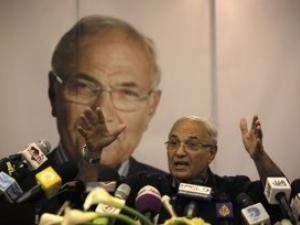Short Description
The unexpected appearance of Shafiq in the runoff of Egypt’s first post-revolutionary presidential race owes much to support from,
The unexpected appearance of Hosni Mubarak’s last prime minister in the runoff of Egypt’s first post-revolutionary presidential race owes much to support from business tycoons and other backers of the old regime.
The candidate, Ahmed Shafiq, 70, gained enormous popularity during the final stretch of the race by appealing to weary Egyptians’ desire for a return to the stability of the old Egypt. But even some supporters acknowledge that he also drew on money and expertise from a vast network of Mubarak’s former supporters, whose National Democratic Party is now banned.
A former air force general, Shafiq finished second in the first round of balloting and faces the Muslim Brotherhood’s Mohamed Morsi in a presidential runoff next weekend. A victory by Shafiq would be seen as a defeat by many who took part in the wintertime revolution last year that ousted Mubarak.
A ‘strange’ turn of events
Some of Shafiq’s rivals have raised questions about the network that aligned behind him. In an interview, Amr Moussa, a former foreign minister, alluded to the mass mobilization of former Mubarak supporters by saying that “something strange” happened in the last weeks before the election.
Moussa stopped short of accusing Shafiq’s campaign of misconduct but said he believed that Shafiq had engaged in “manipulation’’ of a patronage system.
“Everyone is talking about the revival of the machine,’’ Moussa said, expressing concern that Mubarak-era figures will return to positions of influence if Shafiq is elected — a concern that had also been expressed about Moussa himself.
Figures from the Mubarak era can be found throughout Shafiq’s campaign team.
Former aides and deputies who worked for him when he was the country’s minister of civil aviation, from 2002 to 2011, are running Shafiq’s campaign. His campaign manager is Ibrahim Manna, who succeeded Shafiq as minister of civil aviation under Mubarak. His campaign coordinator, Mohammed Qadri, was his deputy at the ministry and has remained with him since.
Other support has come from wealthy businessmen whose companies had close ties to the Mubarak government. A production company owned by Mahmoud Baraka, which also produces shows for state television, donated its services to the campaign. An advertising firm run by Tarek Nour, which designed materials for Mubarak’s presidential campaign in 2005, designed Shafiq’s billboards.
Shafiq did not declare his candidacy until April, much later than his rivals. The idea that he could become president was at first dismissed by the secular forces who took the lead in Egypt’s revolution as well as by Islamists, who assumed that anyone so closely tied to the regime could not fare well in the balloting.
Candidacy was disputed
At one point, Shafiq was disqualified from the race under a law passed by the country’s new parliament that prohibited candidates who had served under the previous regime. His candidacy was reinstated by a presidential election commission, although the country’s constitutional court has yet to rule on the dispute.
In the first round of balloting last month, Shafiq won nearly a quarter of the votes cast. He paid just $500,000 for the billboards, which had been erected before the election to promote public awareness and were awarded to him because of his presidential qualities and non-Islamic background, said Ahmed el-Shannawy, who works for Nour’s advertising agency.






![نصيحتي لك: اذكر الله [1 / 12] نصيحتي لك: اذكر الله [1 / 12]](https://en.islamstory.com/images/upload/content_thumbs/1913613138ragheb-al-serjany-videos.jpg)


Comments
Send your comment